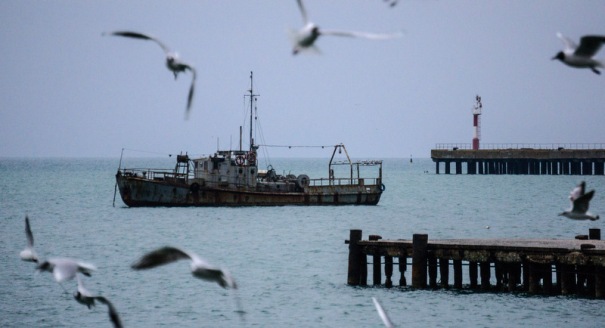On March 18, Russia celebrated the first anniversary of its reunification with (or the annexation of) Crimea. President Putin was a key guest at the spectacular celebration that took place just a few steps away from the Kremlin. The event was billed as a “song and dance show,” underscoring its theatrical and artificial nature. The rest of the country celebrated the anniversary with much less pomp. Public-sector employees—doctors, teachers, and others—reportedly had to be dispatched by their employers to participate in the festivities.
The previously jubilant Russian media is now more concerned with Crimean problems and focuses on the difficulties the peninsula faces as a result of joining the Russian Federation.
First: The peninsula has joined the Russian Federation for good—that is, for as long as the country remains in existence. Whoever becomes Russia’s next president—if that ever comes to pass—will not relinquish Crimea. If Crimea became a part of Ukraine again, the next logical steps would be returning Abkhazia and South Ossetia to Georgia and giving Transnistria back to Moldova. This seems like an impossible scenario. Therefore, Russia’s “partner-adversaries” will be forced to recognize the de-facto annexation of Crimea. (The maps that Russian schoolchildren use will differ from those used by the rest of the world, including China and Kazakhstan).
Second: From an economic standpoint, Russia gained nothing by annexing Crimea. Russia does not need Crimea. Russia did not even need the city of Sevastopol since a new naval base is already being built in Novorossiysk. Acquiring Crimea has put an additional strain on the modest government budget.
It will take a while to integrate Crimea with mainland Russia. New transportation, utility, and financial infrastructure has to be developed at a cost of trillions of rubles. In a similar fashion, Moscow has now been paying for Chechen stability and reconstruction for over a decade.
Third: As the post-annexation euphoria dies down, Crimean residents will start feeling the full brunt of Russia’s problems—the inflation, the unstoppable corruption, the abuse of power, etc. Crimea cannot remain an oasis of contentment in the midst of the country’s stagnation. It will be impossible to modernize the region’s vitally important tourism industry within a short period of time. And even if it were, the industry will have to compete with resorts in Egypt, Turkey, and, to an extent, Sochi. In the future, the ambitious—and more easily accessible—Abkhazia may also join the list of competitors.
Therefore, the elation about joining Russia will soon be tinged with disappointment. Dashed hopes are bound to engender social and political discontent. On top of that, ethnic relations on the peninsula remain tense: 70 to 90 percent of Crimean Tatars (230,000 people or 12 percent of the population) voted against joining Russia. Moscow responded by punishing the Crimean Tatar Mejlis (assembly) and by prohibiting its leader Mustafa Dzhemilev from entering the peninsula. Apparently, the dissent within the Crimean Tatar community that was tolerated under the Ukrainian administration is no longer allowed. There is also a chance that radical Islam will gain ground in the Crimean Tatar community.
Fourth: There is an obvious political impact of the Crimean annexation. The move brought Russia international sanctions and increasing isolation, which have had an increasingly negative effect on its economy in the last twelve months. It appears that the Russian ruling class and its leader, President Putin, did not expect the consequences to be so serious.
Fifth: The ruling class has used Crimea as a tool for consolidating the people around the Kremlin regime. However, the “Crimea factor” is not likely to play this role for long. Public opinion polls already indicate that Crimea is losing its exceptionalism in the eyes of most Russians. More than sixty percent of those polled believe the peninsula should receive only as much government aid as other “problematic” Russian regions.
Russians are just now beginning to realize that the annexation of Crimea has brought them no benefits apart from the pride of living in a country that the rest of the world fears. According to the Levada Center poll, 50 percent of Russians continue to think that the annexation of Crimea was “more positive than negative,” but the number of those who believe that the event had “only negative or mostly negative consequences” has increased to 17 percent. At the same time, fewer Russians are proud of their country (32 percent, down from 34 percent) or rejoice for it (14 percent, down from 19). Despite the propaganda offensive, the Ukraine conflict no longer attracts as much support as it did before. The sympathies for Ukrainian refugees have also diminished—local authorities proved unprepared for the influx of newcomers, and the local residents have not been eager to welcome them either.
Russia’s problems with Crimea and Crimea’s problems with Russia will only continue to grow. We will see the effects of this in a year during the celebration of the second anniversary of the reunification. But next time, we can definitely expect less fanfare.

.jpg)



